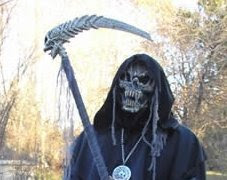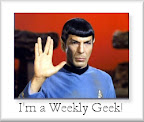 Because you won't sleep. I haven't, for the last three nights or so, and just this morning I woke up after a particularly creepy dream where I was trying to go about my normal life but I had to carry a gun with me to shoot the Gs that were swarming the town.
Because you won't sleep. I haven't, for the last three nights or so, and just this morning I woke up after a particularly creepy dream where I was trying to go about my normal life but I had to carry a gun with me to shoot the Gs that were swarming the town.Yes, I could have the book down and tried to sleep, but you try starting a chapter from this book and then putting it down. I dare you. Anyhow the details:
World War Z: An Oral History of the Zombie War by Max Brooks
Reason for Reading: IRL Bookclub
Rating: 5/5
It's called African Rabies at first, but like so many things during World War Z, the information got mixed up. It actually started in China, with a child who moans and writhes and oozes gray goop instead of blood. In America, the government approves a useless vaccine to placate a population restless with rumors. In Russia, the soldiers who first spot the dead who don't stay dead are forced to turn their guns on themselves to keep the secret. Israel abruptly closes its borders.
But eventually the truth is impossible to deny. The Great Panic sweeps over the entire globe and suddenly humans find themselves in the minority. Governments retreat, if they exist at all, refugees travel... anywhere that seems to offer safety.
When the US Government finally pulls itself together enough to start cleaning out the country of zombies, they face an enemy 250 million strong. An enemy that can't be spooked or have their food supply cut off or be overpowered by exhaustion. An enemy that keeps on coming until their brains are destroyed.
Set in the near future, World War Z is a collection of interviews of survivors of the zombie war. What makes this book so fascinating, and terrifying, is the realistic manner it predicts the world will behave to a threat that takes everyone by surprise. Most governments, it tells us, will bury their heads in the sand until it's too late. And even then, to survive they'll have to make impossible choices about which citizens to save and which citizens to throw to the zombies to keep them distracted.
Although large sections of the book are dedicated to the American front (with plenty of sly references to our current government, celebrities and the unique American way of thinking), this book reaches out to see how other cultures would react to the threat. Some with denial, others with detachment, others with opportunism. Cuba, in this scenario, becomes a major world player and a major destination for North American refugees.
The book flows and builds much better than you would expect what is essentially a collection of short stories to do. Most are horrifying, but some are funny, some are touching, and some have a "Twilight Zone" element to them. The story of a downed pilot in zombie-infested Louisiana was especially memorable.
Zombies are a terrific metaphor, and this book has plenty to say about the government's attitude towards an impossible enemy. When the rumors start about African Rabies, a particularly opportunistic company begins marketing a vaccine for rabies that they claim will protect everyone against the zombies.
We never lied, you understand? They told us it was rabies, so we made a vaccine for rabies. We said it had been tested in Europe and the drugs it was based on had been tested in Europe. Technically, we never lied... Who was going to blow the whistle? The medical profession? We made sure it was a prescription drug so doctors stood just as much to lose as us. Who else? The FDA who let it pass? The congressmen who all voted for the acceptance? The surgeon general? The White House? This was a win-win situation! Everyone got to be heroes, everyone got to make money...It (the vaccine) protected them from their fears. That's all I was selling.
Like the generals who ordered cavalry charges in World War One only to discover that the new rules of warfare had made horses obsolete, all of the technology, the enormous bombs and tanks and strategic thinking of the modern era prove to be completely and utterly useless against zombies. Brooks has imagined out a fascinating method that the US Army eventually adopts to fight zombies, completely unlike anything seen before.
Ultimately, details like that are what make this book succeed. Brooks has clearly spent a lot of time thinking out this apocalyptic scenario and how each of the characters in the book would react to it. We get not only the perspective of a few poor saps holed up in the mall, fending off an army of zombies, but a global view of what's happening. Through each story, we get a different piece of the whole picture.
By the end of the book, I noticed that the actual science of what makes zombies work is never explained. I realized immediately afterwards that it doesn't matter. When I watch Star Trek do I really care that the warp drive defies the laws of physics? Am I disturbed by the fact that Indiana Jones can take six bullets and still beat up three bad guys in a row? (Hmmm....) No, because the book isn't about zombies, it's about the people left behind and how they will face the challenge of their era.
Highly recommended! Read it! Just not late at night, or you may have weird dreams. And in case you're wondering, I have a 40% chance of surviving a zombie war and you can find out your odds here. (Click on "Calculate Risk").















